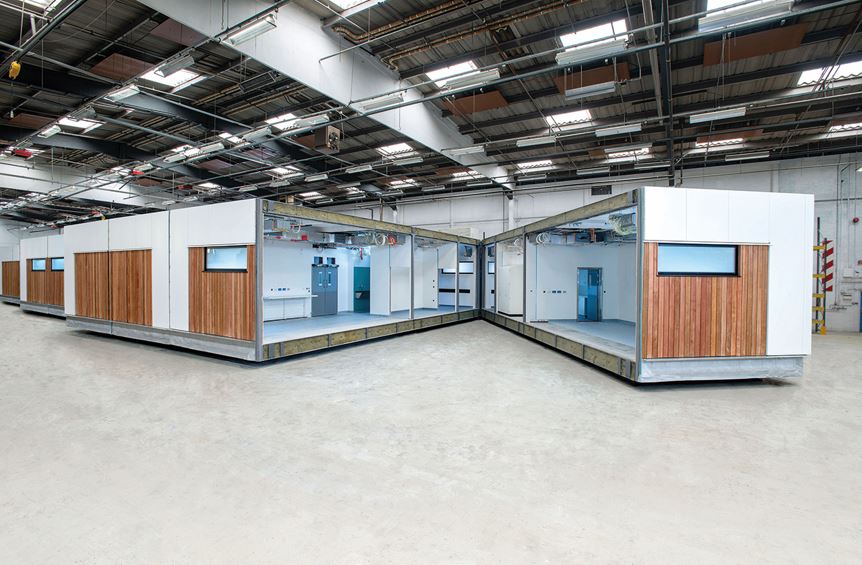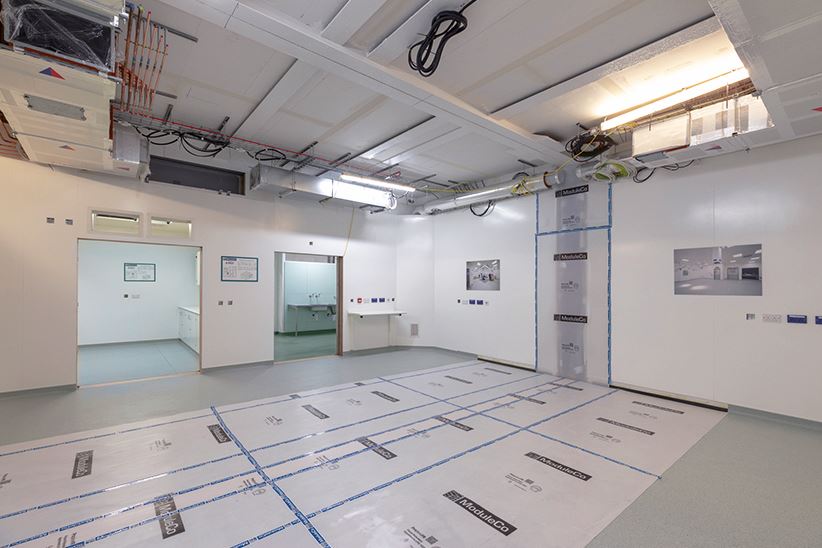
The differences and advantages ‘True Offsite’ design, construction and delivery provide when compared to traditional and hybrid construction
Innovation is paramount in the construction industry, offering alternative methodologies that deliver increased efficiency, sustainability, and cost-effectiveness. This has led to a rapid adoption of Modern Methods of Construction (MMC) by the NHS in recent years which reflects a strategic response to the need for efficient, high-quality, and cost-effective healthcare infrastructure. By understanding the differences in approach, key stakeholders can make informed decisions about the most suitable construction method for their projects.
WHAT ARE MODERN METHODS OF CONSTRUCTION?
MMC can be defined as a process which focuses on off-site construction techniques, such as mass production and factory assembly, as alternatives to traditional building. MMC shifts away from traditional construction methods towards more standardised, factory-controlled processes that allow for greater precision, consistency, and speed in fulfilling construction projects.
WHAT ARE THE BENEFITS OF MODERN METHODS OF CONSTRUCTION?
Utilising MMC can offer many advantages over traditional construction, including:
WHAT IS PRE-MANUFACTURED VALUE (PMV)?
PMV is the percentage of a building’s construction that occurs offsite; the higher the percentage the more the building is completed offsite. Once a facility is delivered to the site, the modules can be rapidly installed thanks to their PMV resulting in fewer deliveries and personnel on-site. These factors can have significant long-term benefits for both the environment and the facility users.
WHY IS A HIGH PMV IMPORTANT?
In short, having a high pre-manufactured value plays a crucial role in ensuring the benefits of a modular project can be achieved. The higher the PMV the greater the benefits of utilising MMC. Most of the construction should take place in controlled conditions and only a short period is required onsite for completion.
WHAT IS ‘TRUE OFFSITE’ CONSTRUCTION?
Offsite manufacturing can be defined as a building designed and constructed under factory conditions, remote from the end installation site. This involves the specialist development, design, and planning, then subsequent manufacture of construction components. ‘True Offsite’ design, construction, and delivery utilises these techniques to streamline the building process much further to include the pre-assembly of these elements, typically up to the point at which they are nearly 100% complete before they are delivered and installed on-site at their final location.
WHAT ARE THE BENEFITS OF ‘TRUE OFFSITE’ CONSTRUCTION?
Lack of onsite disruption
The facility being nearly 100% complete upon delivery results in a significant reduction in vehicles and personnel on site as there is less work required to be completed once it is on-site in its final destination.
Reduced site health and safety risks
As the majority of the construction takes place in a factory controlled environment rather than on an open construction site this reduces exposure to potential hazards such as falls from heights, electrical accidents, or accidents involving heavy machinery whilst also limiting external factors such as weather conditions.
Less site waste production
Materials can be measured and cut precisely, minimising waste whilst implementing efficient recycling programmes for unused materials and reusing materials from one project in another, reducing the amount of waste sent to landfills.
Tight budget control
A factory-controlled environment reduces the risk of unexpected costs due to weather delays, material shortages, or labour inefficiencies, making budgeting more predictable.
Improved construction quality
Quality is significantly improved as modules are manufactured in a controlled environment where conditions are monitored closely. This results in fewer defects and rework, reducing costs associated with rectifying errors during construction.
Concurrent construction
The foundations of the facility can be constructed whilst the facility is under construction in the factory. Which greatly reduces the project timeline.
Rapid capacity expansion for Trusts
The improved construction quality, concurrent construction process and lack of delays from poor weather result in significantly quicker delivery timeframes allowing NHS Trusts to benefit from their new facilities much quicker.
HOW DOES ‘TRUE OFFSITE’ COMPARE TO TRADITIONAL AND HYBRID CONSTRUCTION?
Traditional construction methods have long been the backbone of the construction industry, however with the advancements in technology there has been an increasing interest in more innovative methods to improve efficiency and reduce waste. Hybrid construction is a blend of traditional techniques with modern innovations, delivering empty modules or frames to their final location and then being fitted out on-site. However, they both come with their fair share of challenges.
Sequential processes and delays
Each step often relies on the completion of the previous one. This can lead to delays, especially if there are unforeseen circumstances or changes to the design. True offsite allows for construction of the facility and site enabling such foundations to take place during the same time in the programme.
Labour-intensive
Traditional construction requires a large workforce to complete tasks such as bricklaying, carpentry, and plumbing. This reliance on manual labour can drive up costs and increase the likelihood of errors or inconsistencies in the finished product.
Environmental Impact
Traditional construction methods may not always be the most environmentally friendly option, as they can generate a significant amount of waste and consume resources like timber and concrete at a high rate. Many heavy transport deliveries are required for the provision of traditional building materials which are not required during a true offsite process.
Flexibility
Traditional construction is often less flexible than modern methods, making it challenging to adapt to changing requirements or incorporate new technologies efficiently.
Less control over quality
Most of the engineering installation takes place on site meaning it can be difficult to detect issues such as deviations from design specifications, material defects, or structural weaknesses during the construction process.
WHY CHOOSE TRUE OFFSITE?
When investing in new facilities the financial implications of such decisions are significant, as healthcare infrastructure investments often require substantial funding. Making the wrong choice can result in wasted resources and inefficiencies. By conducting thorough due diligence, healthcare organisations can make informed decisions about new facilities that align with their strategic objectives and financial constraints. MCH are specialists in providing ‘true’ offsite construction, operating solely within the healthcare sector, and providing clinical facilities to the public sector, through innovative Hire, Managed Services and Pay-Per-Use agreements available from no
minimum term. MCH exclusively work within the healthcare sector and provide a range of medical and surgical facilities, including operating theatres, imaging facilities, sterilisation facilities, CC Laboratories, and wards fully compliant with NHS HBN and HTM guidance. We provide the highest levels of PMV with at least 90% of the construction taking place in the factory enabling rapid site installation times. Relocatable after initial use, MCH has experience of moving theatre facilities between trusts after the initial user no longer has a requirement. MCH provide a range of finance options to acquire a new facility including Hire and Managed Service contracts as well as an innovative ‘Pay per Use’ option. Our team provides full end-to-end project support, from groundwork to on-site installation and module fitting, all encompassed in a fixed-term monthly fee.
